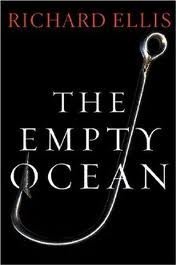What do you think?
Rate this book


Paperback
First published January 1, 2003
Written in 2003, this book argues that humans represent the biggest danger to the world's oceans. Author Richard Ellis comes to the conclusion that if humans will simply (1) quit dumping putrid pollutants into the sea, (2) rein in the most egregious overfishing practices, and (3) establish and rigidly enforce certain “No Fishing” zones, then the ocean will heal itself.
I hope he is right.
The balance of the text consists of chapter-long tales about particular fish (e.g., cod, tuna, broadbilled swordfish) or classes of fish, mammals, and reptiles which were so systematically plundered that the fisheries have been hunted past the point of recovery ( e.g., whales, sharks, sea turtles).
How sad. My rating: 7/10, finished 10/1/20.